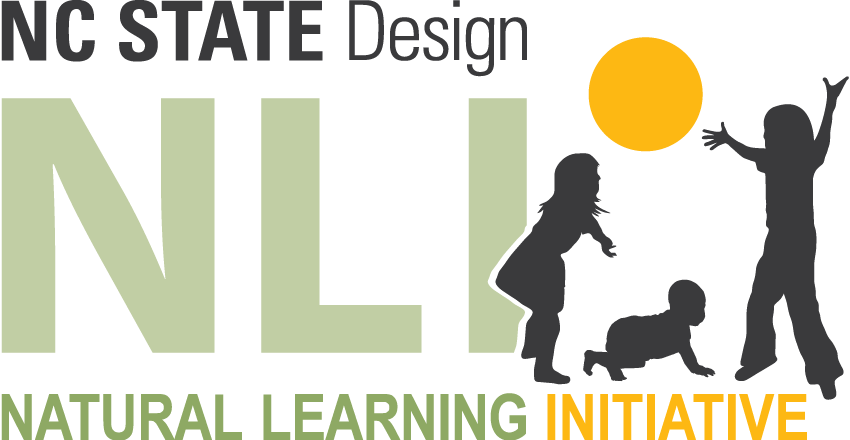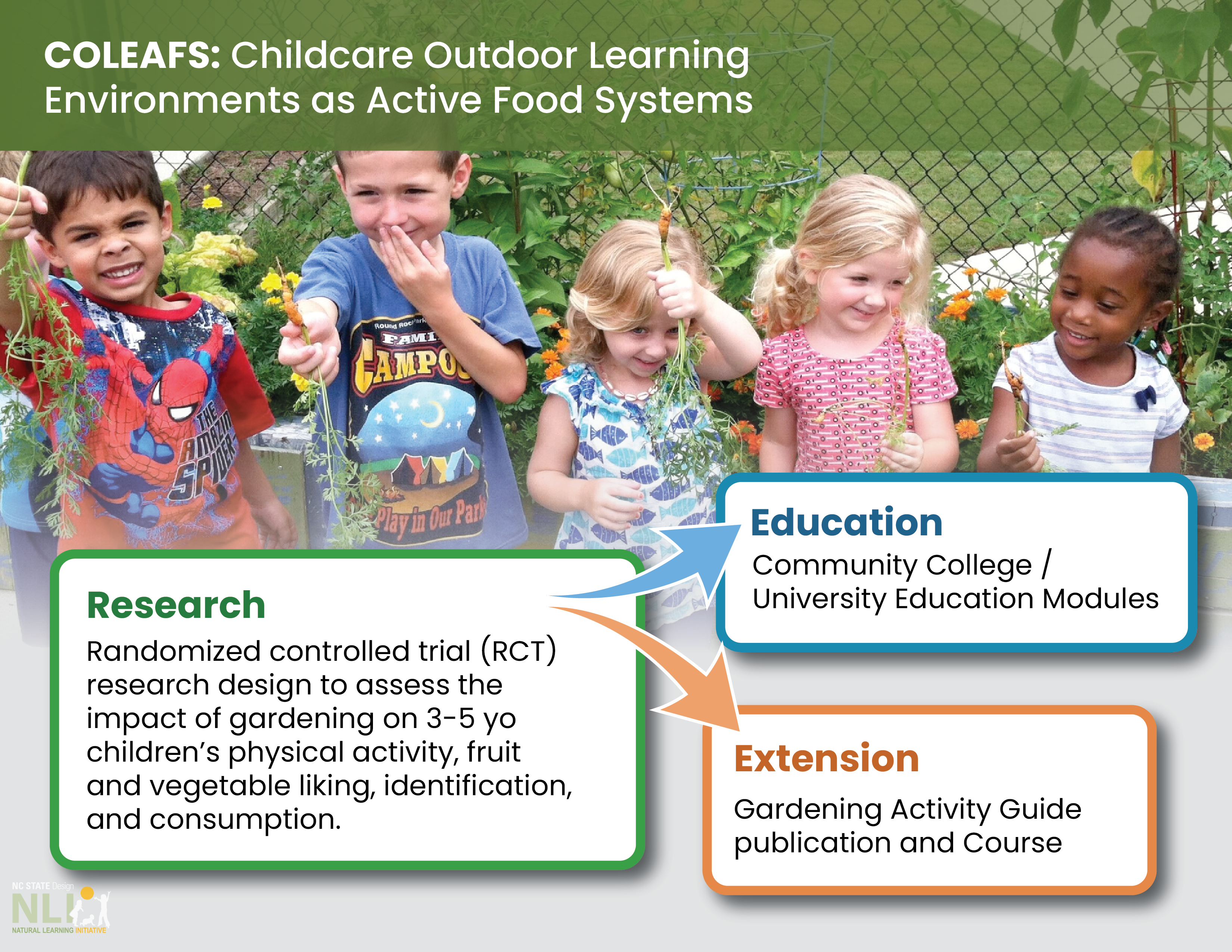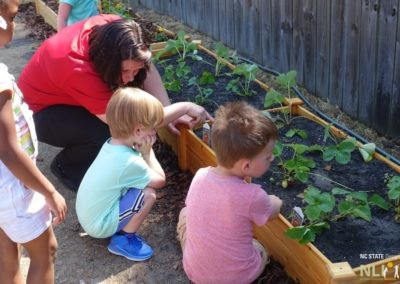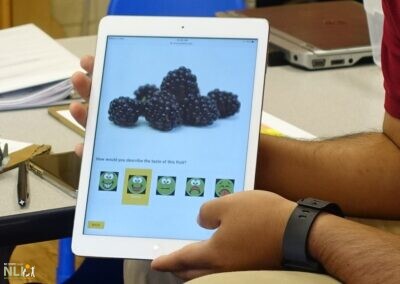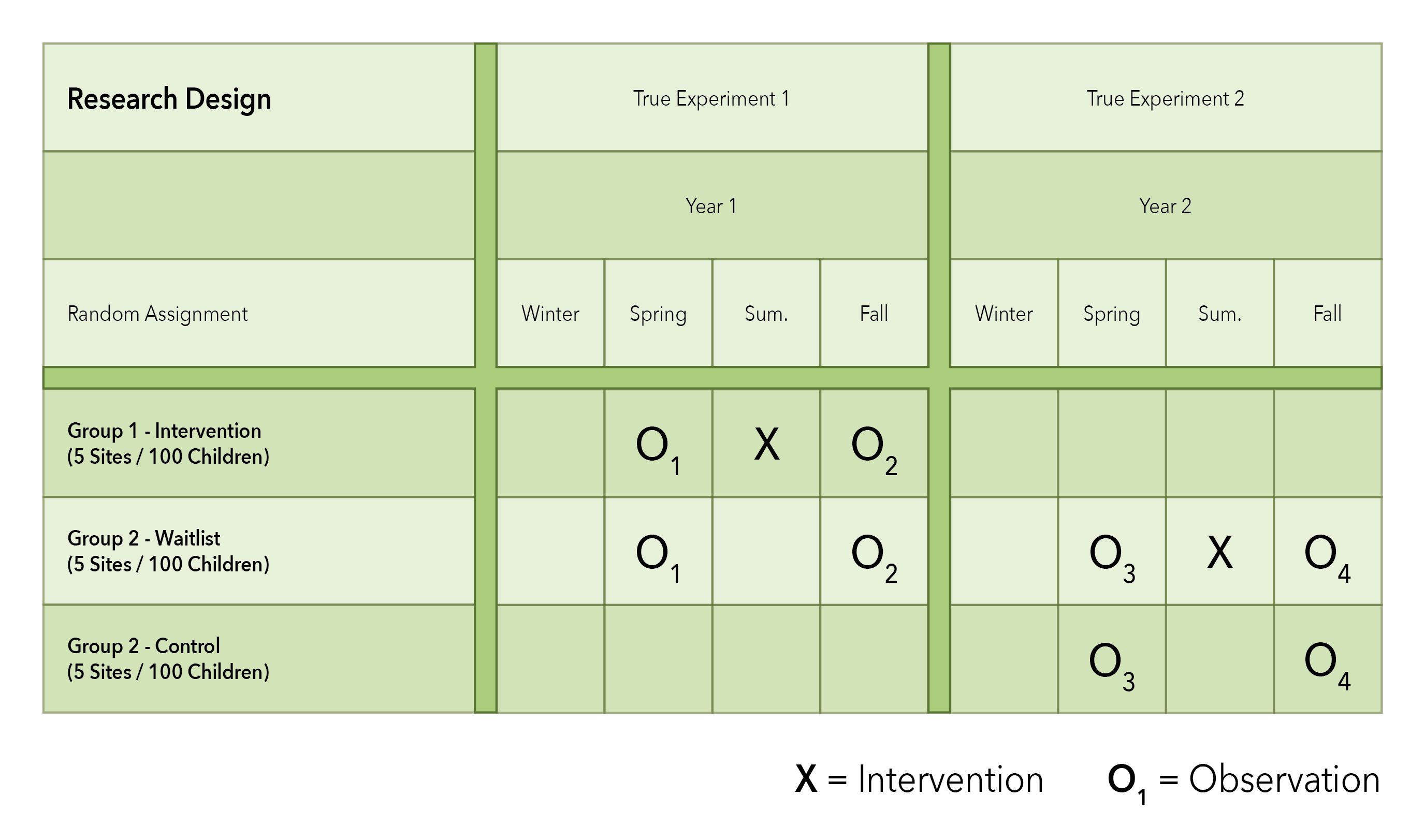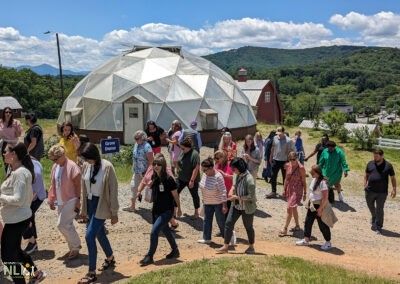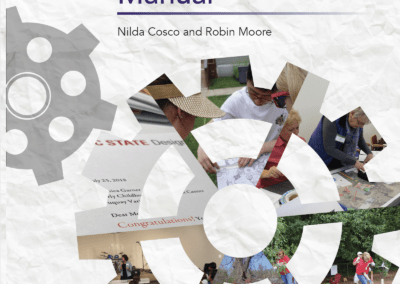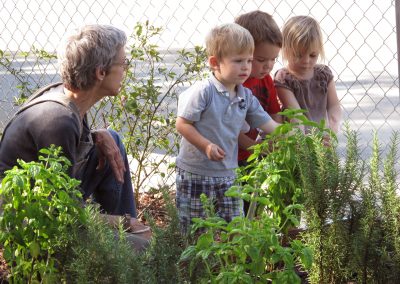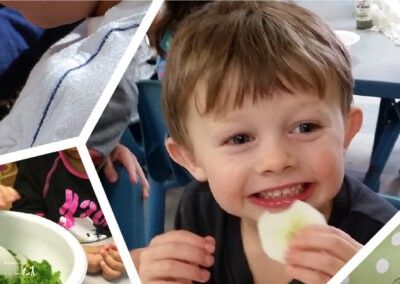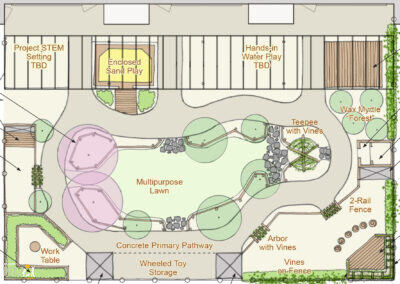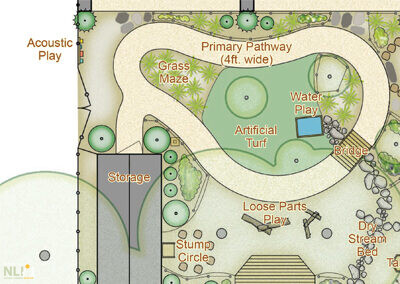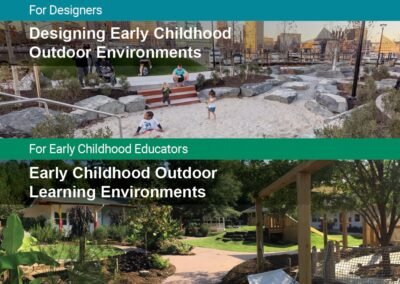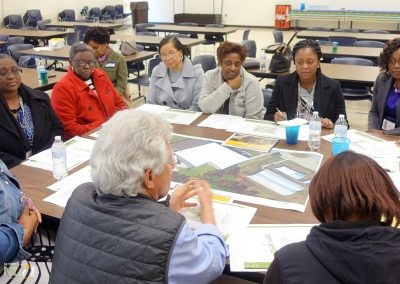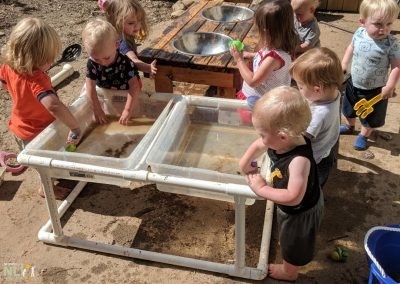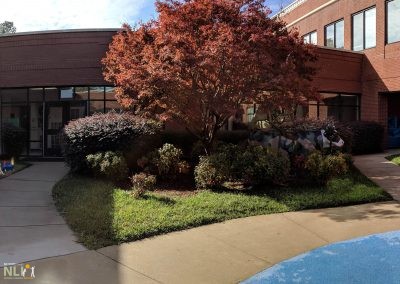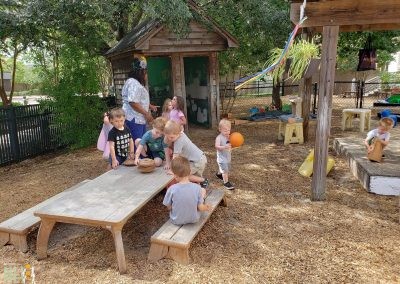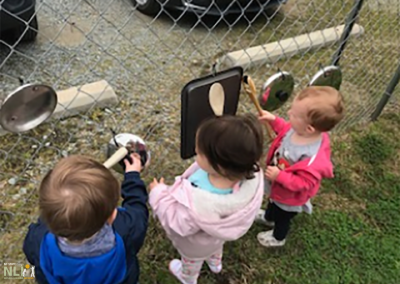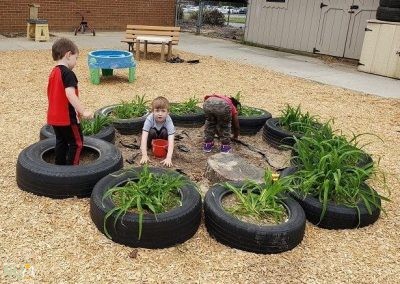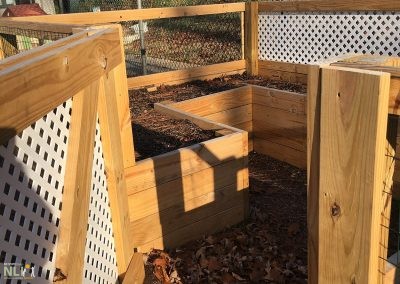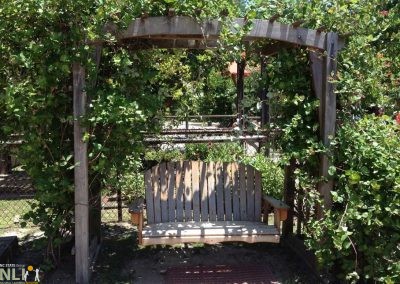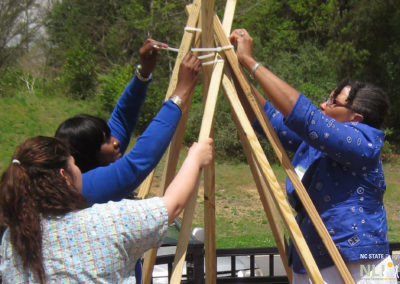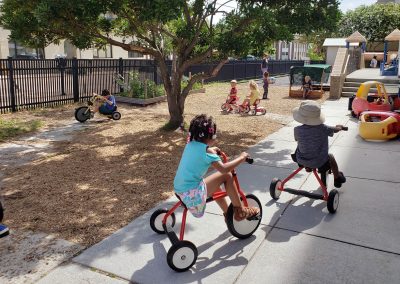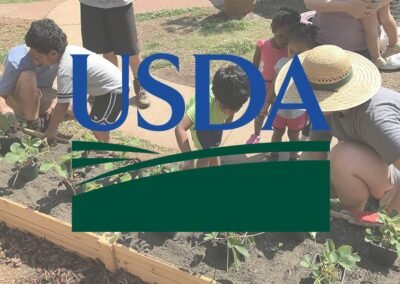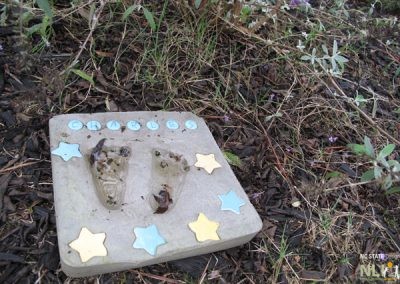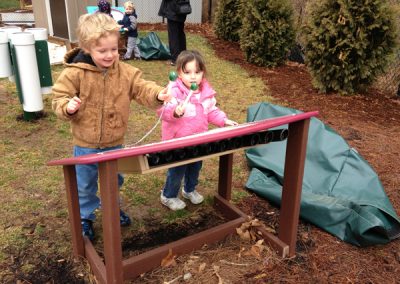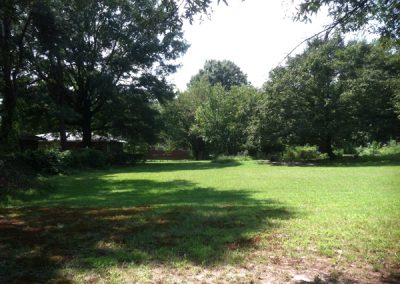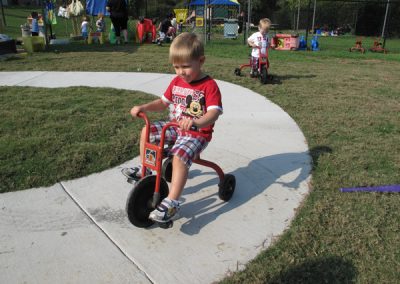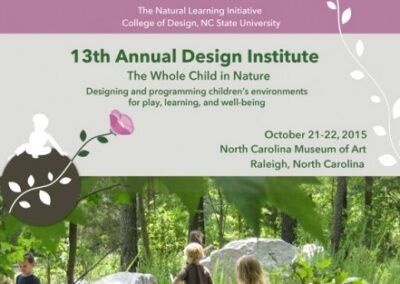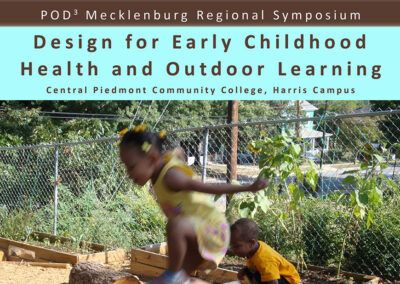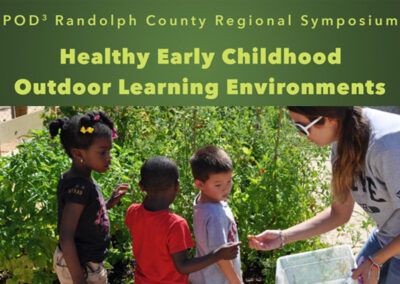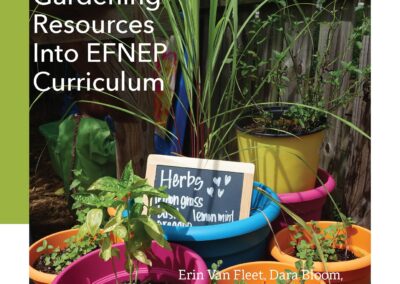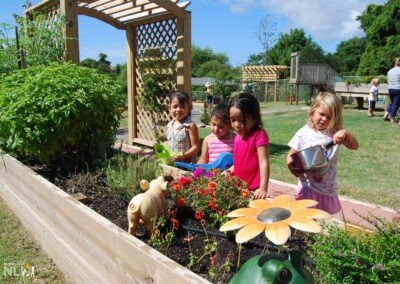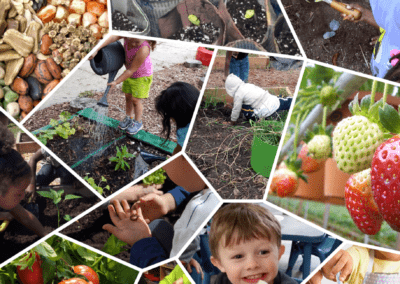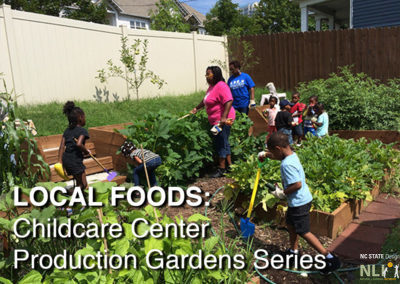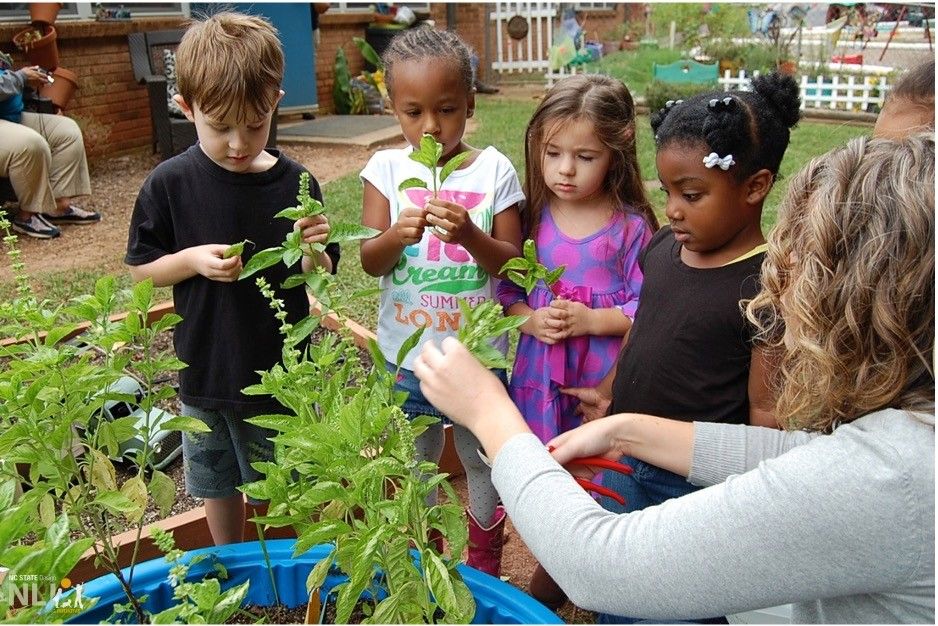USDA COLEAFS
The aim of the Childcare Outdoor Learning Environments as Active Food Systems (COLEAFS) project is to measure the effectiveness of gardening to support fruit and vegetable identification, liking, and consumption and to increase physical activity in preschool children attending childcare. Funded by USDA NIFA, the project integrates research, education, and extension components. Details of the research design were recently published in the International Journal of Environmental Research and Public Health.
LONG-TERM PROJECT GOALS:
- Influence childcare regulations to include hands-on fruit and vegetable (FV) gardening as a health promotion strategy (policy and QRIS systems).
- Increase awareness and understanding of early childhood physical activity and healthy eating through hands-on FV gardening.
- Increase the consumption of fresh FV by preschoolers.
INTEGRATED PROPOSAL OBJECTIVES:
Research Function
- Assess the impact of a Gardening Component on 4-5-year-olds, enrolled in 15 childcare centers in Wake Co, NC.
- Using a waitlist/control group, a randomized controlled trial (RCT) research design, assess the impact of gardening on children’s physical activity, FV liking, FV knowledge, and consumption.
Education and Extension Functions
- Research findings translation
Research Function
The importance of preschool hands-on gardening is boosted by the publication of a third USDA-supported Childcare Outdoor Learning Environments as Active Food Systems (COLEAFS) research article. Results presented in this article link preschool gardening to increased physical activity and reduced sedentary time among children 3–5 years old living in disadvantaged communities in North Carolina. The first article describes the COLEAFS randomized controlled trial design, protocol, outcome measures, and participant baseline characteristics. The second article describes research results linking hands-on fruit and vegetable gardening to significant positive impacts on children learning to identify fruit and vegetables, and on the consumption of both during a tasting session. Consistent with prior research, the intervention impact on fruit consumption was greater than for vegetables. Liking of fruit and vegetables was not significantly impacted by the gardening intervention, which may be due to measurement and/or developmental stage limitations. Replication using alternative methods may help clarify the impact of gardening on liking.
Funded by USDA NIFA, the five-year COLEAFS project integrates research, education, and extension components. The research aim is to measure the impact of hands-on preschool gardening on fruit and vegetable identification, liking, and consumption and on physical activity in preschool children attending childcare in disadvantaged communities. The three open-source research articles published in the International Journal of Environmental Research and Public Health and Frontiers in Psychology can be downloaded on the right.
Research Design
Randomized Controlled Trial, N=15 childcare centers
Childcare Centers randomly assigned to one of three groups:
- Group 1: Intervention (Year 1 Intervention) (5 childcare centers, 100 children)
- Group 2: Wait list Control (Year 2 Intervention) (5 childcare centers, 100 children)
- Group 3: Control (No Intervention) (5 childcare centers, 100 children)
Articles
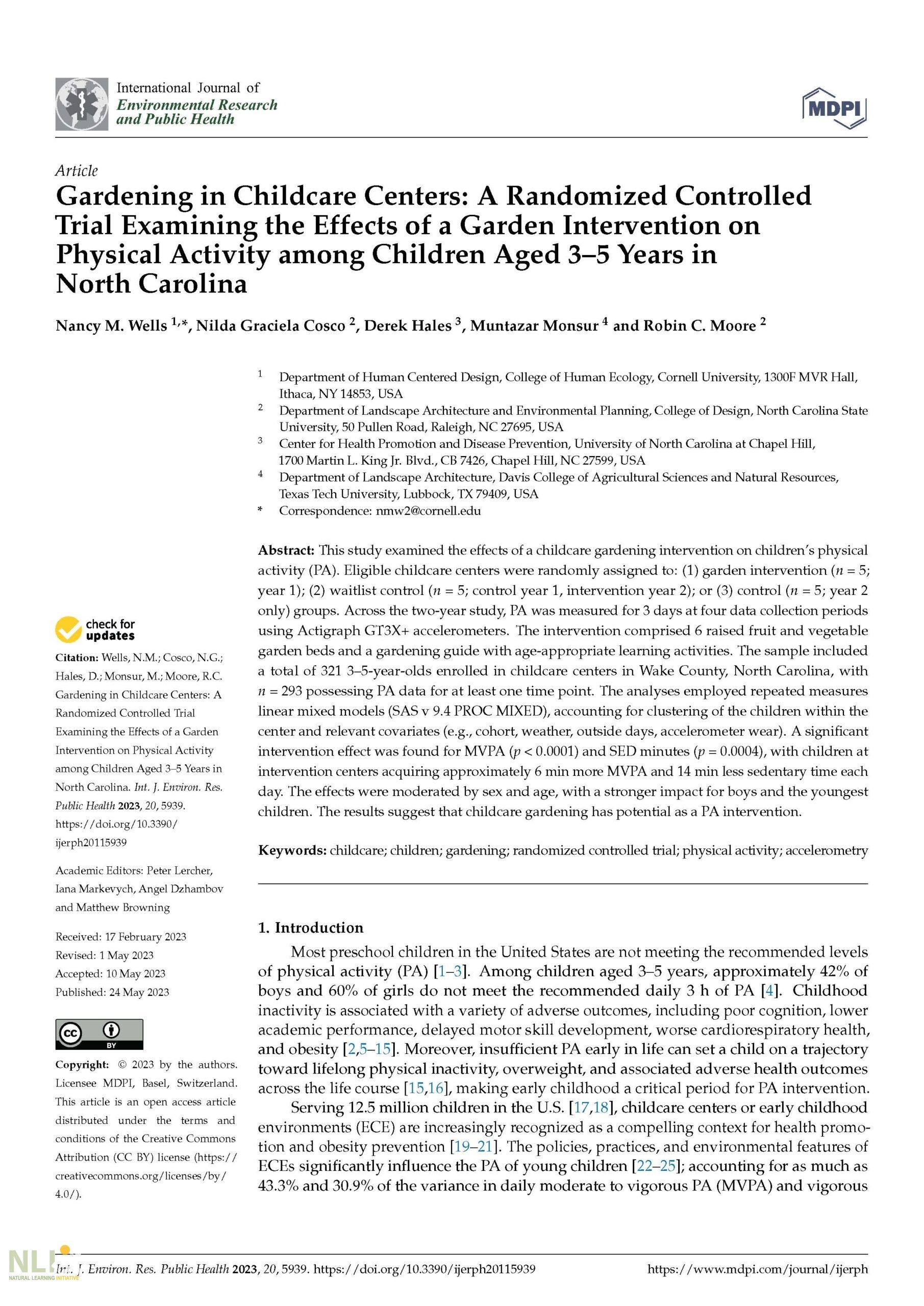
Effects of a Childcare Gardening Intervention on Physical Activity
A Randomized Controlled Trial Examining the Effects of a Garden Intervention on Physical Activity among Children Aged 3–5 Years in North Carolina
Citation: Wells, N. M., Cosco, N. G., Hales, D., Monsur, M., & Moore, R. C. Gardening in Childcare Centers: A Randomized Controlled Trial Examining the Effects of a Garden Intervention on Physical Activity among Children Aged 3–5 Years in North Carolina. International Journal of Environmental Research and Public Health, 20(11), 5939. https://doi.org/10.3390/ijerph20115939
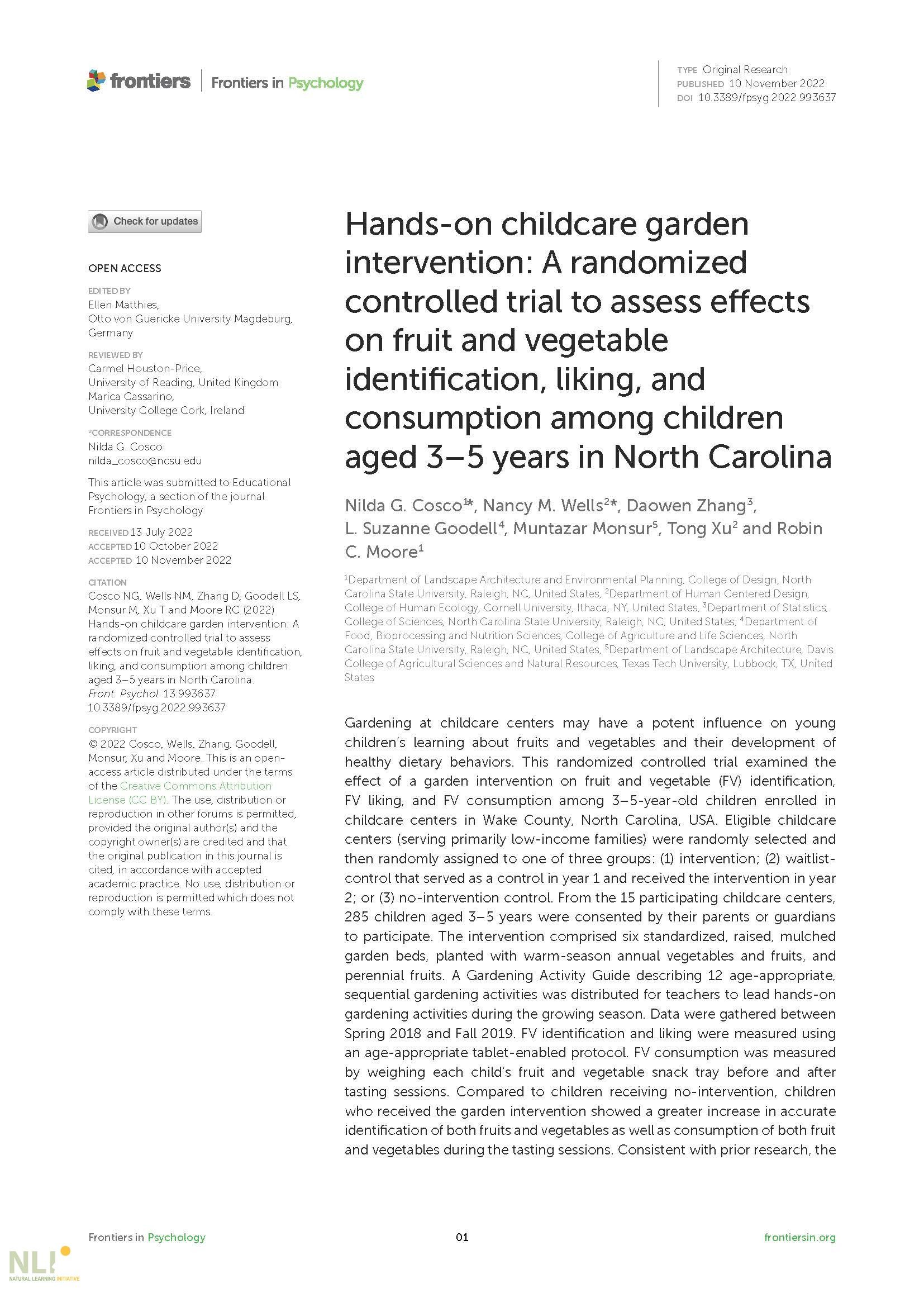
Childcare Gardening Effects on Fruit and Vegetable Identification, Liking, and Consumption
A randomized controlled trial to assess effects on fruit and vegetable identification, liking, and consumption among children aged 3–5 years in North Carolina
Citation: Cosco, N. G., Wells, N. M., Zhang, D., Goodell, L. S., Monsur, M., Xu, T., & Moore, R. C. (2022). Hands-on childcare garden intervention: A randomized controlled trial to assess effects on fruit and vegetable identification, liking, and consumption among children aged 3–5 years in North Carolina. Frontiers in Psychology, 13, 993637. https://doi.org/10.3389/fpsyg.2022.993637
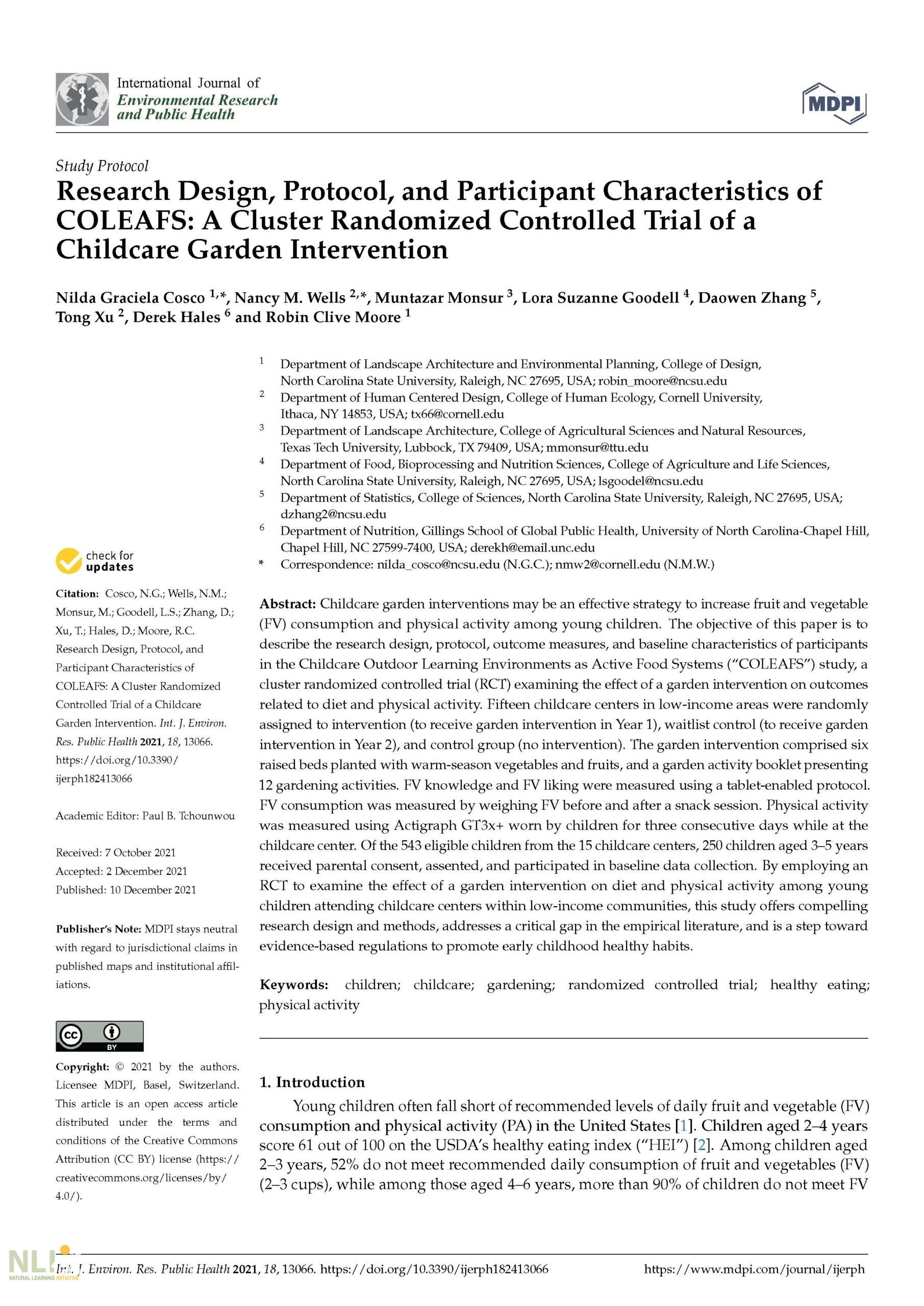
Research Design, Protocol, and Participant Characteristics of COLEAFS
A Cluster Randomized Controlled Trial of a Childcare Garden Intervention
Citation: Cosco, N. G., Wells, N. M., Monsur, M., Goodell, L. S., Zhang, D., Xu, T., Hales, D., & Moore, R. C. Research Design, Protocol, and Participant Characteristics of COLEAFS: A Cluster Randomized Controlled Trial of a Childcare Garden Intervention. International Journal of Environmental Research and Public Health, 18(24), 13066. https://doi.org/10.3390/ijerph182413066
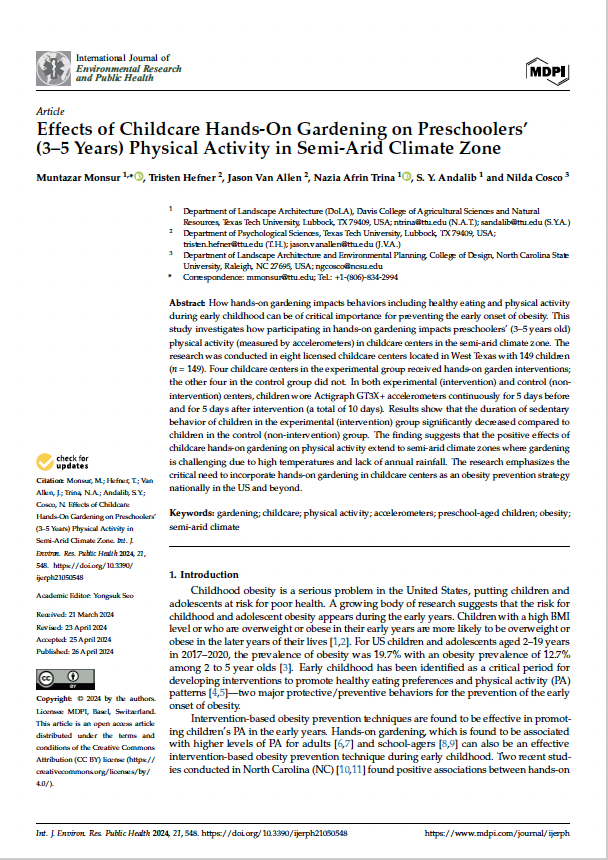
Effects of Childcare Hands-On Gardening on Preschoolers’ (3–5 Years) Physical Activity in Semi-Arid Climate Zone
How hands-on gardening impacts behaviors including healthy eating and physical activity during early childhood can be of critical importance for preventing the early onset of obesity
Citation: Monsur M, Hefner T, Van Allen J, Trina NA, Andalib SY, Cosco N. Effects of Childcare Hands-On Gardening on Preschoolers’ (3–5 Years) Physical Activity in Semi-Arid Climate Zone. International Journal of Environmental Research and Public Health. 2024; 21(5):548. https://doi.org/10.3390/ijerph21050548
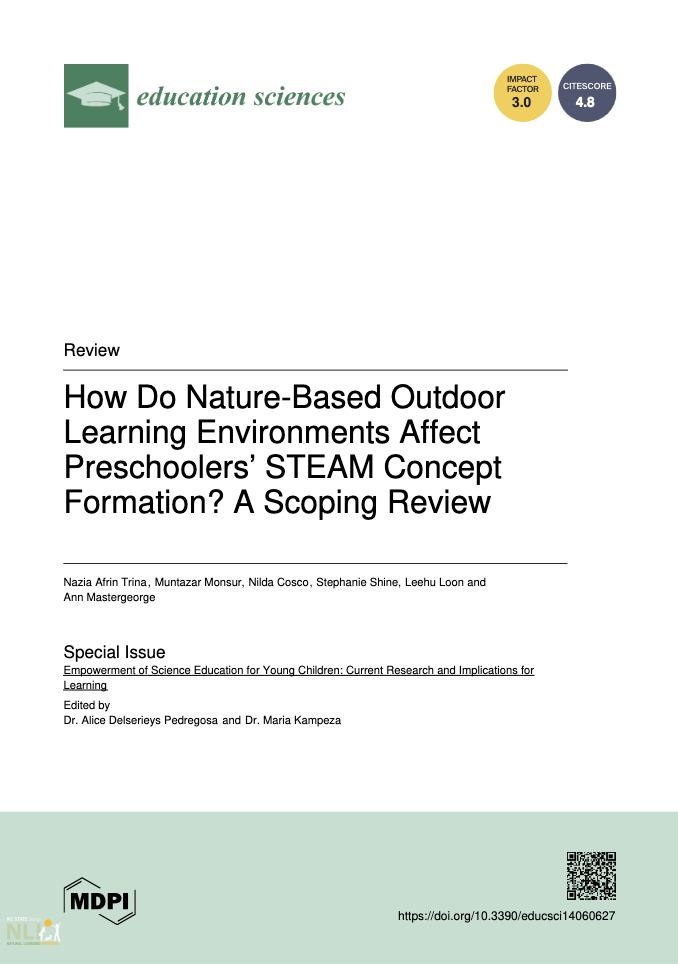
How Do Nature-Based Outdoor Learning Environments Affect Preschoolers’ STEAM Concept Formation?
A Scoping Review
Citation: Trina, N.A.; Monsur, M.; Cosco, N.; Shine, S.; Loon, L.; Mastergeorge, A. How Do Nature-Based Outdoor Learning Environments Affect Preschoolers’ STEAM Concept Formation? A Scoping Review. Educ. Sci. 2024, 14, 627. https://doi.org/10.3390/educsci14060627
Education Function
Develop and deliver academic education modules.
Objectives
To inform community college instructors, and influence standardized educational modules concerning the impact of FV gardening on preschool physical activity and consumption of fresh FVs as a health promotion strategy. Active learning, hands-on participatory activities, and a content-specific Gardening Component will be developed and added to current POD Education Modules for Community Colleges and Higher Education Systems. The POD Modules were created based on experience gathered through prior POD initiatives to address the needs of students in early childhood, culinary arts, movement education, horticulture, landscape design and construction (supported by Blue Cross and Blue Shield of NC Foundation). The Pilot Phase of the Beginner POD Professional Development Module was completed in June 2014. Practice and Mastery Modules have been completed (Spring-2016). South Carolina and Texas are currently adopting the POD model.
Gardening Component adoption will assist in creating a network of aspiring professionals committed to supporting healthy human development across the lifespan through the design of outdoor environments that promote physical activity and healthy eating. Special attention will be given to adaptation to specific geographic characteristics and cultural differences.
Education – Activities
- Modify existing POD Modules to include expanded Gardening Component.
- Identify education networks and potential adopters of Gardening Component.
- Develop-Train-the-Trainer to transfer Gardening Component.
- Organize annual webinar to embed into existing community college courses in early childhood, nutrition, culinary arts, physical education, horticulture, landscape design and construction.
- Identify early adopters and provide technical assistance for implementation.
Create a dissemination plan to include the following tasks: a) Deliver Train-the-Trainer instructor sessions in-person and online twice a year; b) Transfer modules to organizations replicating POD in South Carolina, Texas, and other states as appropriate; c) Meet with faculty at the annual National Association for the Education of Young Children (NAEYC) Professional Development Institute to gain feedback from those using the modules as well as to promote the project to other community colleges; c) Attend National Council for Accreditation of Teacher Education (NCATE) and connect with 2- and 4-year programs.
The POD Education Modules created to support the Gardening Component are aligned with NAEYC Standards for Early Childhood Associate Degree Accreditation. The six standards define learning outcomes in professional preparation programs and present a shared vision of excellence for early childhood educators. The POD Education Modules align with early learning standards and offer a uniform set of materials for potential adopters (e.g. NC Foundations for Early Learning, South Carolina Early Learning Standards, Texas Prekindergarten Guidelines). These standards stress the need for firsthand experiences and opportunities for exploration by young children, such as those offered by FV gardening. Examples applicable to outdoor activities include:
NC Foundations: “Curiosity, Information-Seeking, and Eagerness. Goal APL-1: Children show curiosity and express interest in the world around them. Risk-Taking, Problem-Solving, and Flexibility. Goal APL-5: Children are willing to try new and challenging experiences. Goal APL-6: Children use a variety of strategies to solve problems. Attentiveness, Effort, and Persistence. Goal APL-9: Children persist at challenging activities.”
SC Early Learning Standards: Physical Development and Health: “While mastering these large muscle skills, they are also learning to use the finer muscles of arms, hands, and fingers to build hand-eye coordination, strength, control and object manipulation.”
Texas Prekindergarten Guidelines: “A. Gross Motor Development Skills: Children explore physical space and understand how their bodies function in space through active movement experiences. B. Fine-Motor Development Skills: Fine motor manipulative movements involve object handling activities that emphasize motor control, precision, and accuracy of movement.”
Two certificate programs containing FV gardening material: 1) for early childhood educators, and 2) for designers, installers, and physical plant managers, will also support professional development.
POD Module Guiding Principles
Focused on connecting children with meaningful experiences with the natural world, POD Education Module guiding principles are to transfer knowledge, build capacity on processes and best practices for outdoor learning environments, including those related to FV gardening. Modules are organized in three-tiers: Introductory, Practice and Mastery.
POD Education Modules Overall Goals:
- Illustrate the importance of outdoor learning to support health, wellness and stewardship.
- Provide technical assistance to create healthy childcare outdoor environments.
- Highlight the role of professionals in childhood development.
- Enhance professional development processes.
Gardening Component Goals:
- Provide information on the importance of FV gardening for healthy development.
- Offer TA for installation of childcare FV gardens.
- Specify instructions on FV garden materials, plants, management, seasonal activities, and safety procedures.
- Establish FV gardening and curricula links.
Community College Systems in NC and other States willing to replicate POD
North Carolina. Fifty-eight comprehensive community colleges serve all 100 counties. Service areas of individual colleges may include one or several counties. Instructors representing 21 of them have been involved in the creation and/or piloting of the modules. Ninety five percent of centers in NC are 20 miles or less from a community college.
South Carolina. Sixteen technical colleges located strategically across the state and statewide affiliate programs serve the state, including the Center for Accelerated Technology Training ReadySC™ program and Apprenticeship Carolina™. https://www.sctechsystem.com/aboutus.html. Supported by the South Carolina Department of Health and Environmental Control, Division of Nutrition, Physical Activity and Obesity, two phases of POD transfer were implemented in April 2015 (Florence) and May 2016 (Spartanburg). Universities and community colleges are associated with the initiative.
Texas. Fifty public community college districts are included in the Texas Association of Community Colleges (TACC), a non-profit association serving the whole state. http://www.tacc.org/pages/texas-colleges. A Leadership Academy organized by the Texas Department of State Health Services was conducted in March 2015 where university and community college representatives showed enthusiastic support for replicating POD and requested guidelines and resources for implementation. Model replication was launched in May 2016.
Education – Potential Impact and Expected Outcomes
(S=short term, L=long term)
All outcomes will be measured using annual surveys (instructors and students). Performance will be considered satisfactory if 50% of respondents meet the following in Year 4 and Year 5:
- Increased learning opportunities (lectures, seminars, etc.) in community college early childhood courses related to FV gardening, and the OLE. S
- Increased student/faculty confidence in FV gardening knowledge (e.g. composting, worm bins) and trying new fruits and vegetables. S
- Increased number of students and faculty implement FV gardening projects at childcare centers, family childcare, school-age programs, and community college campuses. L
Education – Potential Pitfalls and Limitations
Educational system variations. Understanding the differing complexities of state educational systems is critical (e.g. no Combined Course Library for Community Colleges in SC or TX). To remediate the situation, input from existing POD network of community college managers and instructors will be solicited (Johnson & Wales University (Culinary Arts), Central Piedmont Community (College Culinary Arts, Early Childhood Education) and Sandhills Community College (Early Childhood Education).
Recognition of a new, multidisciplinary, professional field. All professional education activities are multidisciplinary with instructors representing all fields of interest, which is challenging to achieve. Search for committed instructors continues using a snowball approach to recruit additional adopters.
Rigid standards and regulations regarding outdoor play and learning. Critical working relationships will continue to be developed with state and local regulators, sanitation agents, and multidisciplinary professionals to encourage acceptance of the need for outdoor activities for healthy living including children spending a “significant portion of the day” outside (Harms et al, 1998).
Extension Function
Disseminate end-user information, tools, and resources.
Objectives
To translate and disseminate research findings via eXtension webinars/digital resources, to inform extension agents, parents and educators about the potential for increasing FV consumption in vulnerable preschoolers through FV gardening interventions at childcare centers.
The project team includes key NC State University Cooperative Extension partners: Local Foods Extension Specialist leading the development of the newly created Extension Master Food Volunteer Program, Director of the Extension Master Gardeners Program, and Extension Local Foods Flagship Program Manager (www.localfoodnc.org), with the objective of creating both train the trainer resources and materials for end-users based on research findings, and ensuring their effective dissemination through NC Cooperative Extension and eXtension to support system change. Information flows from an established partnership of universities and college units, including the Natural Learning Initiative, that apply the principles of translational research to influence quality of life in the general population. “Cooking from the Garden” series will be offered through the Expanded Food and Nutrition Education Program (EFNEP) for teachers and parents.
Extension – Activities
- Develop peer-reviewed digital and print resources related to FV gardening.
- Disseminate online FV gardening tools and resources via eXtension, Local Foods Flagship Program, Master Gardeners Network, EFNEP, and other distance and higher education systems to professional and collaborators’ networks, Farm-to-Childcare, and related organizations.
- Identify and engage Extension agents, master gardeners, and community stakeholders in professional education programs.
- Offer FV gardening training to extension agents, master gardeners, community stakeholders, technical assistance providers, and early childhood educators.
- Complement children’s gardening experiences with nutrition education classes for parents and teachers in order to reinforce healthy eating behaviors at home and in childcare meals: “Cooking from the Garden” series via EFNEP.
- Disseminate information, tools, and resources to support parents, community leaders, technical assistance providers, extension agents, instructors, and public health professionals to implement evidence-based, health-promoting activities, including FV gardening, to support system change in early childhood FV gardening policy and practice.
- Consolidate existing link to Farm-to-Childcare, including a project awarded (2016) to the Center for Environmental Farming Systems (CEFS) by the Kellogg Foundation to create a model for farm-to-childcare programs in NC.
- Partner with eXtension Community of Practice, Local and Regional Food systems (CLRFS) Community of Practice and Local Foods Flagship Program, to create information sheets for submission and approval by USDA to be integrated into the Provider Handbook for the Child and Adult Care Food Program – “Nutrition and Wellness Tips for Young Children.”
- Create capacity building for the “greening industry” by adding a section to the NLI Annual Design Institute devoted to early childhood “green design” for master gardeners, extension agents, and green industry students (horticulture and landscape design).
- Create and disseminate childcare naturalization guides for green industry (e.g. plant nurseries, landscaping companies), including FV gardening guides.
- Offer training sessions for green industry representatives.
- Post information at the Green Desk (naturalearning.org/greendesk).
- Help create national strategy for system change/diffusion of innovation plan.
Extension – Dissemination
An Instructional Designer/Webmaster will join the team in Y4 & Y5 after research findings have been generated, and education and extension materials written, to create attractive, targeted online and print publications. A dedicated website will contain digital resources, info-sheets, “edublogs” (Ray, 2006), and distance education opportunities. How-to webinars will be conducted to guide educators to use FV gardening materials, including a train-the-trainer (TTT) model to train childcare providers. Webinars will be marketed through national Cooperative Extension networks including Master Gardeners, the Expanded Food and Nutrition Education Program EFNEP network, and the Southern Region Local Food and Extension listserv. Webinar recordings will be housed on the Moodle platform, eXtension website, consistent with eXtension administration new guidance to serve Extension educators with materials and training. Links to all materials and resources developed by the project will be posted at NLI’s Green Desk – naturalearning.org/greendesk. Key networks to increase reach to multidisciplinary professionals, parents and regulators, include: 1) eXtension Community, Local and Regional Food Systems (CLRFS) Community of Practice; 2) North Carolina Cooperative Extension (NCCE) Local Foods portal (http://localfood.ces.ncsu.edu); 3) Center for Environmental Farming System (CEFS) academic/governmental/community networks, including NC State University, NC A&T (Historic Black Land Grant University), NC Department of Agriculture and Consumer Services, farmers and citizens.
Extension – Potential Impact and Expected Outcomes
S=short term, L=long term)
- Practical materials developed for policy innovators, decision makers, community health promoters, families, and consumers – will support system change in early childhood FV gardening policy and practice. S
- Dedicated FV gardening website hosting all resources developed by the project – will help frontline professionals to achieve FV gardening success on the ground. S
- Online Gardening Modules developed by professional instructional designer – will increase educator effectiveness. S
- Policy strategy recommendations for change in center, local, and state policy regarding health benefits of gardening and outdoor activities of children 4-5 years old – will enhance Local and Regional Food Systems (CLRFS) Community of Practice. L
- Defined benchmarks and skills established for multidisciplinary pre-professional education in early childhood development, nutrition, culinary arts, and landscape construction/horticulture – will support development of new niche market.
Extension – Potential Pitfalls and Limitations
Competing for recognition among the many childhood obesity prevention programs and initiatives. PDs are active members of NC Statewide networks to enable effective coordination with other ongoing projects, including: Integrating Healthy Opportunities for Play and Eating (I-HOPE) NC Advisory Committee for ECE Settings (NC-DHHS/NC-Smart Start); NC Play Alliance, NC Children and Nature Coalition, American Society of Landscape Architects – Professional Practice Network). PDs work closely with the NC community college system including Johnson & Wales University (Culinary Arts), Central Piedmont Community (College Culinary Arts, Early Childhood Education) and Sandhills Community College (Early Childhood Education program).
Competing for attention from Extension agents, parents, and educators. Partnership with Extension will provide effective channels of communication targeting specific areas of interest and need and fostering awareness on the potential of early education environments as health interventions.
Recognizing POD as a significant innovation. New eXtension messaging strategies will reach related professionals (e.g. environmental and culinary fields) to help them understand the new niche market opened by considering childcare as a micro-farming opportunity. Distance education resources will be disseminated through professional associations (e.g. Nursery and Landscape Association (www.ncnla.net, www.nlae.org), and Child and Adult Care Food Program (http://www.cacfp.org).
